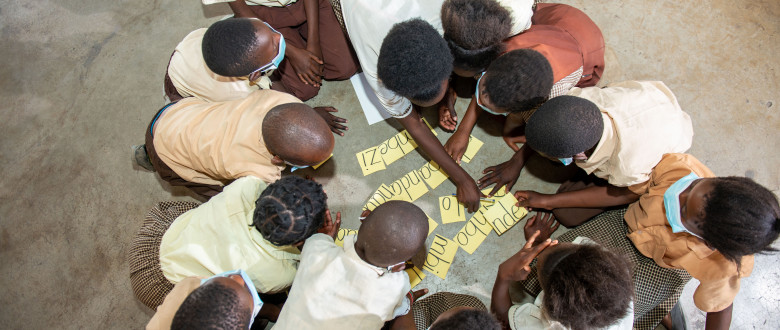
VVOB has a successful history of working in partnership with TaRL Africa and The Ministry of Education in Zambia to support the Teaching at the Right Level (TaRL) approach or Catch Up as it’s known in Zambia. Catch Up is an accelerated literacy and numeracy intervention designed as a holistic approach to improving foundational skills.
At the same time, despite success in scaling, maximising the impact of the Catch Up program on foundational literacy and numeracy outcomes in Zambia requires teachers to take up and consistently use TaRL methods effectively. Teachers aren’t always willing or able to fully implement new activities. Some teachers may choose activities they are proficient in when developing and implementing TaRL lesson plans rather than the most effective activities for the children. Teachers’ beliefs also heavily influence their behaviour in the classroom, and their beliefs likely affect their willingness and ability to change their current practices and take up TaRL methods.
This research aims to provide evidence on how to support teachers to take up and sustain effective Teaching at the Right Level instructional practices for foundational literacy and numeracy.
-
Busara Center for Behavioral Research
-
Zambia Ministry of Education
-
TaRL Africa
The research aims at applying methods from the rich toolkit of applied behavioural science to improve takeup and quality of implementation of Catch Up. We’re also drawing on experience in human-centred design, involving end-users and stakeholders in brainstorming and developing solutions to increase teacher uptake of TaRL practices. As a result, our overall approach is behavioural, human-centred, and contextual. First, we will increase understanding of what barriers are present in limiting take-up and sustained, quality delivery of Catch Up by teachers. First, we will increase understanding of what barriers are present in limiting take-up and sustained, quality delivery of Catch Up by teachers using theories and frameworks from Behavioral Science, including the Theory of Planned Behavior. Secondly, we will identify and experimentally evaluate behaviourally informed solutions to improve the implementation of TaRL methods among teachers in Zambia.
By the end of the project:
The research results will inform the national sustaining and scaling process of Catch Up in Zambia as well as lead to the development to effective solutions to support teachers with TaRL delivery in their classrooms. We hope our work in this space will inspire other organisations that wish to use behavioural insights to increase the uptake of effective teaching methods. We will share our findings in multiple ways, such as through blog posts and journal articles.




